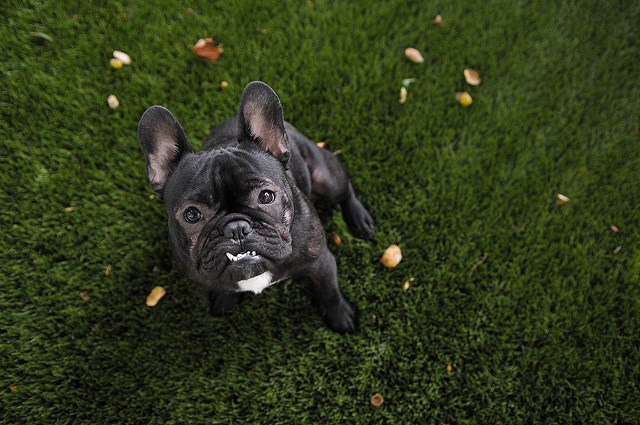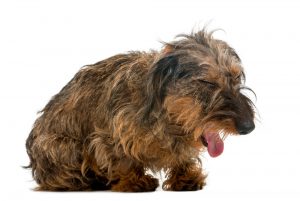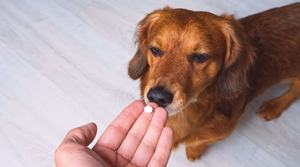
Reviewed & Fact-Checked by
Dr. Chyrle Bonk
Veterinarian (DVM)
Learn more about our Veterinary Review Board »
French bulldogs are cute, endlessly sweet pups that make great pets.
Although they resemble a standard bulldog in many ways - just a smaller version - their distinctive bat ears make them stand out. Their appearance along with their personality and easy care have helped them become one of the best loved of the small breed dogs in the world.
There are, as any Frenchie pet parent quickly learns, some inherent downsides to the French Bulldog though, especially when it comes to their health.
Being a brachycephalic breed, or one with a short face, breathing problems are very common. Pugs, Pekingnese, Boston Terriers, Cavalier King Charles Spaniel, Chinese Shar-Pei, Shih Tzu and Lhasa Apso have similar issues.
Causes of Brachycephalic Obstructive Airway Syndrome
Brachycephalic Obstructive Airway Syndrome (BOAS) is a combination of traits that make it difficult to breathe. Those traits include:
- Narrow nasal openings (stenotic nares)
- A longer than normal roof of their mouth (elongated soft palate)
- Excess tissues in the trachea (everted laryngeal saccules)
- A narrower trachea that may or may not collapse.
These traits are partially as a result of the breeding - and in some cases the over breeding - that went into French bulldogs to make them what they are. It is also due to the facial anatomy of these flat-faced dogs.
Fortunately, breeders are actively trying to breed some of these traits out, so it's important to always choose a responsible breeder when selecting your French bulldog puppy.
It should be noted that not all French bulldogs have breathing problems as a result of that little cute nose and that some only develop severe problems with it later in life.
Caring for Brachycephalic Dogs
For those French bulldogs who do have mild difficulty breathing, taking a few preventative measures can often make sure that any issues don't become too much of a problem.
- Make sure that walks are not too long or too strenuous
- Pay close attention to the temperature and prevent your pup from overheating.
- Use a harness instead of a collar
- Maintain a healthy weight
- Get regular veterinary check-ups to carefully monitor your dog's condition and catch any changes early on.
- Careful monitoring as they age is important too, since, as we mentioned, some breathing problems only occur later in life.
Another option that may be available to a French bulldog's pet parent however is nose surgery, like in the image below (before and after Rhinoplasty surgery on a French Bulldog) to help correct the physical 'defects' that cause Frenchie specific breathing problems in the first place.
Another option that may be available to a French bulldog's pet parent however is surgery. This can consist of one or more procedures to correct any abnormalities that could be causing breathing difficulty.
Is Nose Surgery for French Bulldogs Worth It?
In some cases, a pet parent may be given the option to consider surgery to shorten an elongated palate and/or widen their stenotic nostrils so that breathing difficulties can be alleviated or prevented in the future.
In the right hands these are actually relatively straightforward surgeries and most healthy French Bulldogs recover well from them after just a few days of recuperation.
They are however, also quite expensive and, as is the case for humans, any surgery however minor, comes along with certain risks. So the question that many Frenchie pet parents find themselves asking is whether or not nose surgery for French bulldogs is actually worth it?
The answer to that question is very hard to define.
Many pet parents who have opted to have surgeries performed report that they feel that their pup has a 'new lease on life' and seems to be able to breathe better. There is certainly no arguing that that can only be a good thing.
For the most part though these are pups that were having serious problems already, and surgery was decided to be the best course of action to improve the quality of their lives. Dogs with minor issues might not benefit as much as those with severe problems.
Does Your Frenchie Really Need Corrective Surgery?
The real question however is whether these surgeries should be performed as a "preventive measure" on a pup who is currently not experiencing any serious ill effects of their stenotic nostrils or soft palate.
Often, in mild cases, avoiding over exercise and excessive exposure to the heat will be all a French bulldogs needs to breathe just fine. However, more severely affected dogs may need surgical correction just to live a relatively normal life. When deciding whether your or not your dog needs corrective surgery, consult your vet.
Signs Your French Bulldog May Need Nose Surgery
Dogs that are severely affected by stenotic nares requiring corrective surgery will show some of the following symptoms:
- Significant upper airway stertor (noisy breathing) particularly during inhalation
- Blue gums due to lack of oxygen
- Fainting
- Unable to exercise and lagging behind in walks.
Similarly, dogs that have an elongated soft palate may show up with:
Dr. Bibevski and team at Cor Veterinary Surgery Services who specializes in surgical services for Brachycephalic Obstructive Airway Syndrome or BOAS explains:
"The reason for that loud noise (an anatomical feature of a brachycephalic breed) is because the soft palate extends back into their throat- past the epiglottis. In the video it shows how the soft palate and epiglottis should sit/come together correctly. You can appreciate in the bottom left photo how much tissue needed to be removed to produce this outcome. It is such a rewarding surgery because immediately post surgery their sound is dramatically different if not absent. This is only one of the corrections that can dramatically affect their quality of life!!!"
Having surgery to correct a French bulldog's breathing should be decided on a case-by-case basis. Along with your veterinarian, you can decide if your dog's condition warrants correction or if you can make some lifestyle changes to better accommodate your dog.
In short, no pet parent should assume that getting nose surgery for their French Bulldog is a must or, something that should be done as a matter of routine.
Instead they should learn, with guidance from their vet, how to recognize the signs of breathing trouble and respiratory distress in their pup, what they can so to help prevent it and how they should react in an emergency or if problems do seem to be developing as the pup ages.

Image Credit: Hallahmoon
BOAS Surgery Costs
Correcting Brachycephalic Obstructive Airway Syndrome in French bulldogs can be very expensive. Expect to pay between $200 and $1,000 for stenotic nares resection and $500-$1,500 for a soft palate resection.
The cost of surgery varies depending on the severity, where you live, if the procedures can be combined, and the dog's general health.
After surgery, most dogs bounce back to normal within a day or two but will have to be closely monitored for about a week thereafter to ensure stitches don't accidentally come out.
We can only imagine as humans what it must be like for a pup who has been struggling to breathe to finally get more fresh air into their lungs on a constant basis.
But be guided by the experts - your vet and if necessary a surgical specialist - rather than what some people might just think is probably a good idea just because of the breed of dog they are.
If you have any questions or concerns about your pug, French bulldog or any other brachycephalic breed, don't wait.
Call your vet for a check-up and physical examination to see if Brachycephalic Obstructive Airway Syndrome is affecting your Frenchie or to see if there are any other issues affecting his breathing.





This was very interesting. My Frenchie is possibly having BOAS Surgery so there was a lot of helpful information on this blog.
Glad you found the article helpful, Sofia! Best of luck with your pup’s surgery!
I have a 10 month old french bulldog he snores so loud when he sleeps I want to see about getting the surgery for him
Best of luck to your pooch Kevin, let us know how it goes!